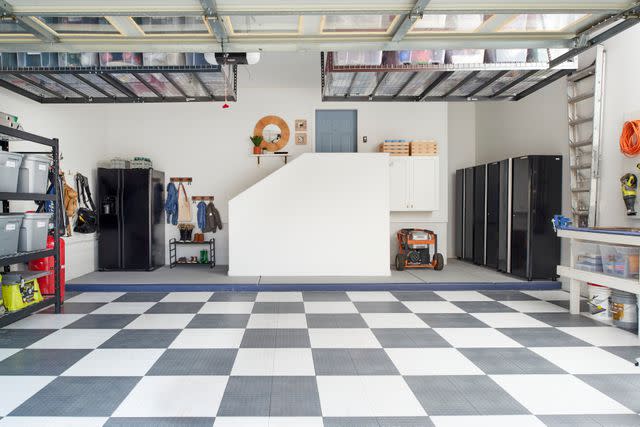5 Best Garage Floor Options (and 3 to Skip)
Know the pros and cons of these popular garage floor materials before you commit.
Garages can protect more than your car. Easily repurposed, they can become a storage space, home gym, or workshop for DIY projects. The best garage floor options will depend on your garage's intended use. Ideal flooring choices can vary with factors like climate, budget for installation, and maintenance demands. Popular garage flooring options include vinyl, epoxy, concrete, stone, and rubber tiles. Whether for an outdoor detached garage or an insulated attached garage, upgraded flooring can make a big difference in your garage's look, feel, and versatility. Here are some of the most popular garage floor options and their pros and cons.

Jay Wilde
Standard Garage Floor Options
Concrete
Concrete floors are generally resilient with a beautiful reflective finish. They can withstand high pressure without giving way to wear and tear. Whether polished, painted, or stained, concrete garage flooring is affordable and readily available for a fast turnaround. Although polishing can be time-consuming, polished concrete is stain-resistant and easy to clean, making it ideal for car storage, art projects, and mudroom use. However, it offers no cushion or insulation, so it's best for attached garages and moderate climates.
Painted concrete is versatile and allows for a truly customizable look. Some specialty paints can also reinforce the concrete and protect it from fuel and oil spills. However, painted concrete is prone to scuffing and chipping, especially common with daily garage use.
Vinyl Plank
Standard vinyl garage flooring includes vinyl plank and composite tile (VCT). Vinyl plank, or luxury vinyl tiles (LVT), is fantastic for low-traffic garages. It is available in different types, including engineered vinyl plank (EVP). Available in various styles and wood-mimicking finishes, LVT is waterproof and easy to clean.
But vinyl plank is not climate-resistant. If your garage is exposed to the elements, this may not be the best choice. Similarly, it is not made to withstand the weight of vehicles and the stains they can leave behind.
Vinyl composite tile (VCT) is more robust than vinyl plank because it combines vinyl chips with durable fillers like limestone. Keeping it shiny, however, requires a lot of maintenance, including regular cleaning, buffing, and waxing. It can also easily be stained by car tires or leaks.
Interlocking Rubber Tiles
Much like the flooring in a gym, rubber tiles can be perfect for a garage retrofit for a home fitness enthusiast or a playroom. Rubber tiles are available in different colors and can be customized with several patterns and borders. They're great for hiding cracks in a concrete floor, though they work best when the garage floor is level. Rubber tile flooring requires limited maintenance, is easy to clean, and is reasonably priced. They can be installed on any subfloor and complement concrete floors well.
Epoxy Flooring
This garage floor option involves applying a coat of paint containing a built-in hardener to the existing floor. Epoxy flooring is durable, has a great aesthetic appeal, and is available in various colors and finishes, including marble, metallic, and granite. Epoxy is damage-resistant and can handle substantial weight.
The disadvantage of epoxy flooring is that it emits an unpleasant odor that is especially toxic during application. It has a lengthy curing time that may extend up to 72 hours, depending on the type of coating and amount of paint applied. This flooring does not absorb moisture and, when wet, presents a significant slipping hazard.
Stone Flooring
This garage flooring includes higher-end options like sandstone, graphite, and flagstone. These usually come in tile or pebbled (bound with epoxy). They can have a sophisticated look when professionally fitted and installed. The cost of installation is higher than other garage flooring, which can be a deterrent for homeowners.
Since stone flooring can become extremely cold in winter months, it's not ideal for continued personal use. And while this kind of flooring can withstand the weight of parked cars and vans, stone is porous. This means any leaks or spills will likely stay unless the garage flooring is professionally cleaned. The aesthetic benefits have to be weighed against practicality.
What is the average cost of installing garage flooring?
Some factors that affect the cost of garage flooring include the materials, labor, size of the space, condition of the structural foundation, and ongoing maintenance. The average price of installing garage flooring is between $2 and $15 per square foot. For example, concrete slab installation typically ranges between $4 - $8/ sq. ft and epoxy between $5 - $9/ sq. ft.
Garage Flooring Materials to Skip
Pure Concrete
While painted, polished, or stained concrete are solid garage flooring options, pure concrete is less so. It can be permanently discolored or degraded by minor mishaps.
Wood
Wooden garage flooring is also an unconventional choice. It could be attractive and viable in certain environments, but it is wise to consult a structural engineer before committing to this material. Wood can become a fire hazard, especially due to fuel and oil spills. Also, it is not moisture and humidity-resistant. Heavy objects can also damage wood floors.
Standard Indoor Carpet
Standard carpets are also a no-go for garages. Specialized carpets made from polyester, nylon, and polypropylene synthetic fibers are strong enough to withstand garage use. They are durable and fire-resistant. Standard carpets, however, are not built to withstand the pressure of tires and will wear away very quickly. They are also a major fire hazard.
For more Better Homes & Gardens news, make sure to sign up for our newsletter!
Read the original article on Better Homes & Gardens.

